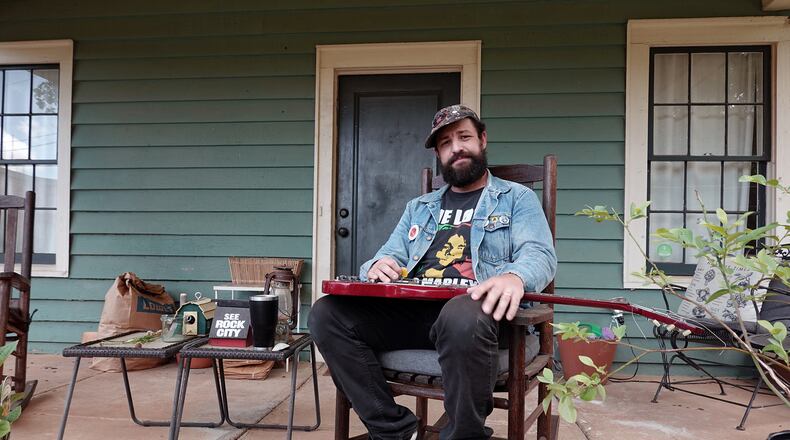Best known as a punk-inflected Southern rocker, Alabama-born singer-songwriter Lee Bains is an everyman polymath of sorts.
Over a decade-plus, Bains has released three full-length studio albums with his band, the Glory Fires, plus a live album that captures the raucous sound and fury and probing social commentary that defines his style.
As far as formal education, Bains studied writing, and has a degree in English from New York University. Late last year, the New Yorker published “Work Lunch,” his poetic meditation on Southern foodways, with photos by artist and Spelman College professor Nydia Blas.
By contrast, since moving to Atlanta some 10 years ago, Bains has mostly worked construction jobs, and nowadays he calls himself “a handy man.”
“I do all kinds of odd jobs — carpentry, painting, Sheetrock repair, roof repair,” he said just before hitting the road on a tour that will land him at the Earl in East Atlanta on Aug. 27.
Bains’ stirring new album, which was released on Aug. 5, is called “Old-Time Folks” (Don Giovanni Records). Fittingly, it focuses on working class struggles through a lens that often puts Atlanta in the spotlight, and is marked with layers of history.
Credit: Handout
Credit: Handout
Longtime Glory Fire bandmate brothers, Adam and Blake Williamson, were part of the recording sessions for the album, but won’t be touring with Bains this time. Instead, Loamlands, “a distorted country music outfit” that features singer-songwriter Kym Register, will be opening the shows and serving as Bains backing band.
“Old-Time Folks” was produced by David Barbe at Chase Park Transduction studio in Athens, notable as the place where a string of Drive-By Truckers albums were made.
“I’ve looked up to him so much as a musician, and a producer, of course, but the more I’ve gotten to know him, the more I just look up to him as a guy,” Bains said of Barbe. “He manages to keep such a level head, and he’s very patient, and humble, and hard working.”
Credit: Joe Steinhardt
Credit: Joe Steinhardt
As it turned out, all those honorable qualities were needed, because “Old-Time Folks” was not only a new direction for Bains, much of it was recorded during a time of COVID-19 protocols.
“As you can imagine, it was pretty tough,” Bains said. “It would have been tough even if COVID wasn’t going on, because we were trying to do something deeper and fuller and more considered.”
From his perspective, Barbe was more than happy to help push Bains’ music in new directions, bringing in a host of players and instruments, including strings, horns and organ.
“I’ve always thought they were a tremendous live band, and I always dug their records, but I always felt there was something more to be had from a Lee Bains record,” Barbe said. “And man, he sure came in with the songs this time — songs that deliver the more complex content of his writing. He came in with a real concept, and it was so good, there was no need to compromise.”
A big part of the concept has to do with Bains’ belief in the often unheralded works of ordinary people, or as he says and sings, “The Lord don’t make no trash.”
“It’s all stuff I was trying to think about and write about,” he said. “It was me trying to make contact with the fact that so much of what pushes us closer to what I would conceive of as God’s will has been done by working class people and normal people fundamentally working together in common interest. I think so often the stories that are propped up in text books or mass media are stories of a great individual. But that’s really not how it worked.
“The reason for the emancipation of enslaved people wasn’t Abraham Lincoln. It was that a ton of enslaved people fought back. And a lot of people of conscience, whether in the Underground Railroad, or abolitionists, or Quakers, or free people of color, worked together to make these changes happen.”
Among the album’s most stirring songs, “The Battle of Atlanta” — which was singled out for a haunting, multi-exposure video shot around the city — name-checks Terminus, the Bankhead projects, Summerhill, and “The City Too Busy To Hate.”
“Gentlemen” is an elegiac remembrance, with shoutouts to Cabbagetown, the Highlands, and down-home, old-time folks, like Bains’ grandparents.
“I was thinking about conversations I’d had as a child, with elders who had lived through the Depression, and the pre-WPA South, and World War II, and the ways that I heard these very old-fashioned, deep-rooted ideals talked about.
“I find deep values in many of those ideals. It’s also a way of wrestling with how we are actually living them out. I miss my grandparents, and I miss their communities. It’s that connection to old-time. You know, the world didn’t start the day you were born.”
As Bains the handy man agreed, the song that serves as the embodiment of “Old-Time Folks” is “God’s A-Working Man.”
It tracks just before the epilogue that ends the album, conjuring the rollicking rhythms and grooves of the Band, with a refrain that proclaims, “Every morning I hit my knees and thank God my God’s a working man.”
“I was aiming for that to be the coda,” Bains said. “Or if you had just one song for the record, that would be the key in trying to bring the various streams together.”
MUSIC PREVIEW
Lee Bains and the Glory Fires with Loamlands
8 p.m. Aug. 27. $13-$15. The EARL, 488 Flat Shoals Ave. NE, Atlanta. 404-522-3950, badearl.com.
About the Author
Keep Reading
The Latest
Featured




